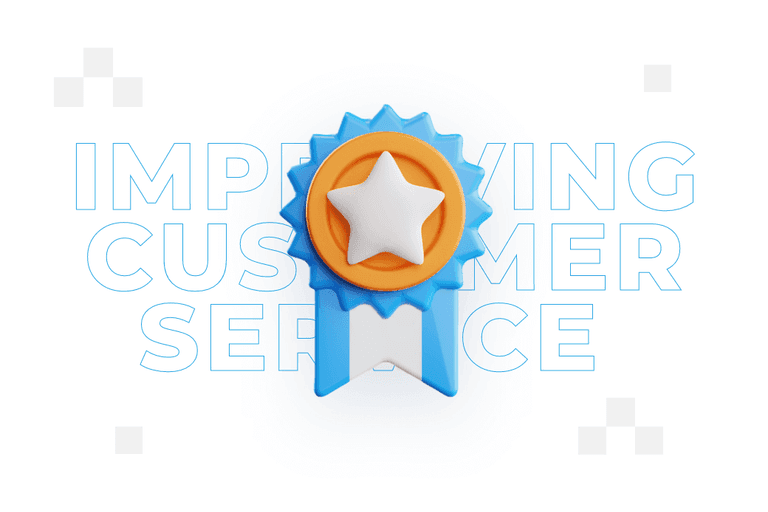
Improving customer service – proven ways

High standards of customer service are often the most important factor in ensuring that a customer remains loyal to a brand. Unfortunately, both research and the experiences of many of us show that customer service still leaves a lot to be desired. It is therefore extremely important to strive for higher and higher levels of customer service. From this article you will learn:
- What is the importance of a customer service department?
- How do you select employees for the customer service department?
- How to improve the quality of customer service?
Table of contents
Importance of the customer service department
Customer service employees are those who have direct contact with consumers. Among other things, they are responsible for communicating with customers, answering their questions and helping them with any problems or difficulties they may have in using products or services.
Proper communication with consumers, on the other hand, makes it possible to build long-term, valuable relationships. In the future, these can turn into loyalty from customers who will not only return, but also recommend the company to others, thus becoming brand ambassadors. Adhering to established customer service standards can therefore contribute to generating greater long-term profits. Improving the quality of customer service will have a measurable impact on:
- Customer satisfaction
- Consumer loyalty
- Positive company reputation
- Competitive advantage
- Customer retention
- Innovation and development
Selection of customer service employees
A department specializing in customer service also has a significant impact on a company’s reputation. Committed and competent employees will make consumers speak positively about the brand, while those who do not care about proper customer service can bring down a wave of negative reviews on the company.
When creating a customer service department, it is therefore important to select the right people who will meet customer expectations and care about customer satisfaction. In the candidate selection process, elements such as:
Education and experience
The right education can provide the candidate with the necessary theoretical knowledge of customer service. In particular, studies in marketing, business, communication or psychology will be useful. These will provide a solid foundation for understanding communication strategies or consumer decision-making processes.
Specialised courses and training in customer service will also be valuable. These will demonstrate the candidate’s commitment and interest in this area. Certificates held will also prove that a person applying for a job in customer service has up-to-date knowledge of communication practices and trends in the area and building valuable relationships with consumers using relationship marketing.
In the staff recruitment process, it is also worth considering the candidate’s experience. If he or she has already worked with customers, it is likely that he or she has the necessary practical skills – for example, he or she will know how to handle difficult situations and how to work under time pressure and communicate with consumers. What’s more, there is a good chance that such a person will adapt more quickly to the new working environment, which will speed up the onboarding process considerably.
A good first impression
In addition to education and competence, the first impression a candidate makes during a recruitment interview is also extremely important. Many factors influence the first impression, such as punctuality, appropriate dress, general appearance or communication skills. These aspects are important in any recruitment process, but in the context of customer service, they really matter. If a candidate is late for an interview for no particular reason, how can we be sure they won’t be late for customer meetings? The same applies to the ability to choose the right attire – this is a business card that customer service staff in particular need to take care of.
Soft skills
Soft skills are also crucial for customer service employees. They have a direct impact on the quality of customer service, customer satisfaction and, consequently, the profits generated by the company.
Communication skills are particularly important in this context. This is because they allow for clear and understandable communication, active listening and appropriate response to customer needs. They also enable the customer service employee to know how to adapt their communication style to different customers and situations.
Customer service employees often have to deal with difficult situations and react quickly to problems that arise. For this reason, the ability to think creatively, to be analytical and to proactively seek solutions is important.
In addition, candidates applying for customer service jobs should be empathetic, patient and consumer-oriented. Customers are truly diverse – in terms of goals, expectations, characters, disposition. Each of them must be offered an individual offer and the highest possible level of service. In some cases this can be difficult. This is where empathy, patience and orientation to the needs and expectations of the consumer come in handy.
It is worth remembering that soft skills are often more important than education or experience. In many cases, they are the prerequisite for a high level of customer service, which is what every business expects from its employees.
Commitment
Committed employees are often more productive, loyal and willing to enter into long-term cooperation with a company. For this reason, it is worth taking the commitment factor into account during the recruitment process. But how do you find out if a candidate will be a committed employee in the future? Consider elements such as:
- interview preparation – familiarity with the company and the position demonstrates a real interest in the industry and the offer, which can translate into future engagement at work,
- employment history – it is worth betting on candidates who can boast a long track record in previous jobs – this can be evidence of their commitment and a chance that they will also engage in the new environment.
Improving the quality of customer service
Improving customer service is like polishing a diamond – a process that requires not only precision, but also imagination. Great customers are pearls, and we, as jewelers serving them, must use the highest quality tools and techniques to make our diamonds shine like the sun in a blue sky. Improving the quality of customer service is a process that is critical to the success of any organization.
Better service to consumers translates into consumer satisfaction, builds loyalty and creates a positive, brand-related experience, among other things. When looking to improve customer service, pay particular attention to activities such as:
Collecting feedback from customers and employees
One of the most effective strategies for improving customer service is to collect feedback – both from consumers and employees. This knowledge allows you to understand what is working well and what needs improvement. In addition, it is possible to gain valuable insights in the context of potential product or service innovations.
Information from customers provides companies with insights into their actual experiences and expectations. Customer satisfaction surveys, product reviews, feedback, comments or messages on social media and direct conversations are particularly useful here. Frontline employees can also provide valuable information – they can see which solutions are having the desired effect, what problems consumers are facing and what their expectations are. Their observations and suggestions are therefore invaluable.
Remember that collecting feedback is only the first step. In order for them to effectively contribute to improving the quality of customer service, it is necessary to take the next step, which is to analyse the data collected and then implement changes based on the findings. It is also extremely important to monitor the effects of the changes made.
Regular employee evaluations
Through evaluation, it is possible to identify those areas in which an employee is performing well and those that, for some reason, need to be improved. This, in turn, makes it possible to implement additional support or training, which will ultimately lead to an improvement in customer service.
Regular evaluations are also helpful in monitoring progress and in planning the employee’s career path. Employees who know they have the opportunity to develop and improve their skills, on the other hand, are often more committed to their work and this translates into better customer service. Remember, however, that evaluation should be transparent and focus on constructive criticism and the pursuit of continuous development.
Motivation system
An incentive system is another tool that can improve customer service. This is because by rewarding employees for their efforts and results, companies can increase their commitment, which, in the case of the customer service department, will have a direct impact on better contact with consumers, meeting their expectations and, ultimately, customer satisfaction.
Above all, effective motivation will be financial bonuses, given as a reward for the achievement of specific goals (this could be the company’s overall performance or the employee’s individual customer service achievements). However, not all rewards need to be financial. Also motivating will be courses, training, conferences, public recognition, an award or even small gifts, which will make the employee feel that his or her efforts have been appreciated and he or she will want to continue to engage in the activities.
Training
Training is an extremely important factor in improving customer service. Its main benefits are:
- Improved competence – useful especially for employees who are just starting out in the industry (although not only such employees). Through training, they gain the chance to supplement their theoretical knowledge, which will then allow them to improve their customer service standards.
- Skills development – training enables employees to develop the skills they need to provide effective customer service. They can improve their communication or problem-solving skills.
- Up-to-date knowledge – the customer service industry is dynamic and constantly evolving. Regular training will therefore help employees to keep up to date with the latest trends and practices, so that the customer service process can be improved.
- Improved performance – employees who are well trained are characterised by greater confidence, which significantly affects their efficiency and productivity, as well as their relationships with customers.
Balanced objectives
The quality of customer service is also influenced by the goals you set for yourself and your customer service staff. Make sure that they are, above all, realistic. If you set the bar too high, the effect can be counterproductive. Overly ambitious goals are demotivating and can lead to frustration – especially if they are not achieved. A tense customer service atmosphere can have a negative impact on customer relations and service levels. Realistic goals, on the other hand, will be motivating – achieving them will give satisfaction to all team members.
Defined goals should also be measurable. This way, you will be able to track progress and evaluate the effectiveness of your actions. For this purpose, you can use indicators such as customer satisfaction scores (CSAT), first contact resolution (FCR) or net promoter score (NPS).
Efficient internal communication
Thanks to efficient communication within the team, individual team members can get answers to their questions in a short space of time and thus solve customer problems more effectively. Shared knowledge and experiences are essential. This is because mutual support enables the effective implementation of precise solutions that have a positive impact on, among other things, customer service standards.
Effective communication is also very important from the entrepreneur’s point of view. When employees speak directly about customers’ problems and needs, it is possible to introduce necessary optimisations (e.g. product-related), which increase consumer satisfaction and thus contribute to higher company profits.
Friendly working environment
A friendly working environment is conducive to the effective fulfilment of duties. This makes it more likely that an employee will be willing to go the extra mile to help the customer and provide excellent service.
Furthermore, a friendly working environment reduces stress levels among employees. Instead, employees who are not stressed show more patience, which is helpful in building valuable relationships with customers.
It is also worth noting that employees who value their working environment are much less likely to seek other employment. On the other hand, limited staff turnover is particularly important in the customer service department. They need to be familiar with the company’s offers, products and services. Another issue is the knowledge of regular customers – employees with a long track record will know how to communicate with specific consumers, which will improve the quality of customer service, resulting in customer satisfaction and long-term, valuable relationships.
Technological solutions
The quality of customer service can also be improved by the use of appropriate technological solutions. This is because technology can streamline processes, facilitate access to necessary information and positively impact the customer experience. Solutions such as the following will be helpful in improving the quality of customer service:
- Customer Relationship Management (CRM) systems – CRM systems are primarily helpful in organising and monitoring customer interactions. They make it possible to collect detailed information about consumers, such as contact details, purchase history, notes from previous conversations or preferences. This enables employees to provide a personalised service to customers.
- Chatbots and artificial intelligence – chatbots and AI can be used to automate parts of the customer service process. This is because these tools can answer frequently asked questions, redirect customers to the right departments or solve simple problems. In this way, they save valuable time and enable employees to focus on more complex tasks.
- Communication tools – these primarily refer to email, social media or video conferencing, which enable effective communication with customers. They also allow for quick variable responses to customers’ needs and provide them with answers in the way they prefer.
- Knowledge management tools – these include knowledge bases, FAQ sections, guides and tutorials. With these, consumers can solve their problems themselves, without having to contact customer service.
By using the above-mentioned technological solutions, you can continuously improve your customer service, which in turn will translate into customer satisfaction and loyalty to your brand.
FAQ
Contact form
Develop your brand
Rate content:
You may be interested in:







